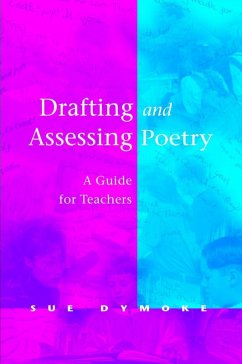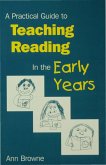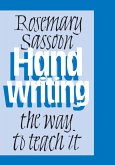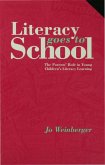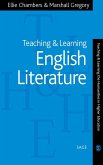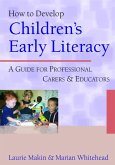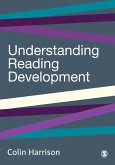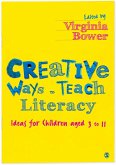`This excellent book provides the reader with comprehensive coverage of all aspect of poetry teaching. The book does more than inform us - it inspires profound reflection on the best ways it support poetry writing and draws us into the debate about assessment-driven curriculum' - School Librarian
`A must for trainee teachers and English departments' - Booktrusted News
`Drafting and Assessing Poetry is thoroughly researched and shows how attitudes towards teaching of poetry and indeed the place of poetry on the syllabus, has changed with political fashion over the years, but more importantly, Sue Dymoke shows how a handful of contemporary poets go about drafting their work and sees this process as an essential tool in the classroom, advocating that students should keep drafting notebooks, just like real writers.
Getting students, or indeed members of writing groups, to understand that one draft of a poem may not be the final or best work they can produce will never be a problem again!' - Writing in Education
`Sue Dymoke's book is a much needed antidote to the ubiquitous guides to poetry analysis.... This book is well worth reading for its clarity and wealth of ideas' - Bethan Marshall, TES Teacher Magazine
`Every English department should buy this remarkably comprehensive book. Inspiring approaches for teaching children to write poetry are clearly described. Sue Dymoke draws upon her extensive experience as a poet, English teacher and researcher to explore the place of writing poetry in English lessons and examinations. Her unique insights into both the writing and teaching of poetry should prove invaluable to English teachers' - Dr Mark Pike, Lecturer in English Education and Head of PGCE English, University of Leeds
`It is a useful book: a theoretical text, but with a practical focus, which makes it very readable and interesting, to teachers of young people particularly, but also, to teachers of adults and indeed in parts to poetry writers themselves, particularly those interested in working in schools, or simply curious about the general process of drafting and evaluating poetry' - County Lit, Nottinghamshire County Council Literature Newsletter
Drafting and Assessing Poetry offers a range of teaching strategies for developing students' poetry writing skills, and guidance about assessment approaches. Critical commentaries combine with illustrations of successful classroom practice to consider this essential but under-explored aspect of English teaching. Based on theory but with a practical dimension, the book engages readers in current critical debates about poetry teaching and its place in an assessment- driven curriculum.
This book is for reflective practitioners, including trainee teachers, who want to develop their understanding of poetry teaching and to gain insights, which will inform classroom practice. It will also be useful for literacy co-ordinators, teacher educators and other advisory staff in the field of English teaching.
`A must for trainee teachers and English departments' - Booktrusted News
`Drafting and Assessing Poetry is thoroughly researched and shows how attitudes towards teaching of poetry and indeed the place of poetry on the syllabus, has changed with political fashion over the years, but more importantly, Sue Dymoke shows how a handful of contemporary poets go about drafting their work and sees this process as an essential tool in the classroom, advocating that students should keep drafting notebooks, just like real writers.
Getting students, or indeed members of writing groups, to understand that one draft of a poem may not be the final or best work they can produce will never be a problem again!' - Writing in Education
`Sue Dymoke's book is a much needed antidote to the ubiquitous guides to poetry analysis.... This book is well worth reading for its clarity and wealth of ideas' - Bethan Marshall, TES Teacher Magazine
`Every English department should buy this remarkably comprehensive book. Inspiring approaches for teaching children to write poetry are clearly described. Sue Dymoke draws upon her extensive experience as a poet, English teacher and researcher to explore the place of writing poetry in English lessons and examinations. Her unique insights into both the writing and teaching of poetry should prove invaluable to English teachers' - Dr Mark Pike, Lecturer in English Education and Head of PGCE English, University of Leeds
`It is a useful book: a theoretical text, but with a practical focus, which makes it very readable and interesting, to teachers of young people particularly, but also, to teachers of adults and indeed in parts to poetry writers themselves, particularly those interested in working in schools, or simply curious about the general process of drafting and evaluating poetry' - County Lit, Nottinghamshire County Council Literature Newsletter
Drafting and Assessing Poetry offers a range of teaching strategies for developing students' poetry writing skills, and guidance about assessment approaches. Critical commentaries combine with illustrations of successful classroom practice to consider this essential but under-explored aspect of English teaching. Based on theory but with a practical dimension, the book engages readers in current critical debates about poetry teaching and its place in an assessment- driven curriculum.
This book is for reflective practitioners, including trainee teachers, who want to develop their understanding of poetry teaching and to gain insights, which will inform classroom practice. It will also be useful for literacy co-ordinators, teacher educators and other advisory staff in the field of English teaching.
Dieser Download kann aus rechtlichen Gründen nur mit Rechnungsadresse in A, D ausgeliefert werden.
`A must for trainee teachers and English departments' - Booktrusted News
`Sue Dymoke's book is a much needed antidote to the ubiquitous guides to poetry analysis.... This book is well worth reading for its clarity and wealth of ideas' - Bethan Marshall, TES Teacher Magazine
`It is a useful book: a theoretical text, but with a practical focus, which makes it very readable and interesting, to teachers of young people particularly, but also, to teachers of adults and indeed in parts to poetry writers themselves, particularly those interested in working in schools, or simply curious about the general process of drafting and evaluating poetry' - County Lit, Nottinghamshire County Council Literature Newsletter
`Drafting and Assessing Poetry is thoroughly researched and shows how attitudes towards teaching of poetry and indeed the place of poetry on the syllabus, has changed with political fashion over the years., But more importantly, Sue Dymoke shows how a handful of contemporary poets go about drafting their work and sees this process as an essential tool in the classroom, advocating that students should keep drafting notebooks, just like real writers.
Getting students, or indeed members of writing groups, to understand that one draft of a poem may not be the final or best work they can produce will never be a problem again!' - Writing in Education
`This excellent book provides the reader with comprehensive coverage of all aspect of poetry teaching. The book does more than inform us - it inspires profound reflection on the best ways it support poetry writing and draws us into the debate about assessment-driven curriculum' - School Librarian
`Sue Dymoke's book is a much needed antidote to the ubiquitous guides to poetry analysis.... This book is well worth reading for its clarity and wealth of ideas' - Bethan Marshall, TES Teacher Magazine
`It is a useful book: a theoretical text, but with a practical focus, which makes it very readable and interesting, to teachers of young people particularly, but also, to teachers of adults and indeed in parts to poetry writers themselves, particularly those interested in working in schools, or simply curious about the general process of drafting and evaluating poetry' - County Lit, Nottinghamshire County Council Literature Newsletter
`Drafting and Assessing Poetry is thoroughly researched and shows how attitudes towards teaching of poetry and indeed the place of poetry on the syllabus, has changed with political fashion over the years., But more importantly, Sue Dymoke shows how a handful of contemporary poets go about drafting their work and sees this process as an essential tool in the classroom, advocating that students should keep drafting notebooks, just like real writers.
Getting students, or indeed members of writing groups, to understand that one draft of a poem may not be the final or best work they can produce will never be a problem again!' - Writing in Education
`This excellent book provides the reader with comprehensive coverage of all aspect of poetry teaching. The book does more than inform us - it inspires profound reflection on the best ways it support poetry writing and draws us into the debate about assessment-driven curriculum' - School Librarian

